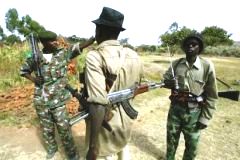INTERVIEW-Darfur rebels use human shields-Sudan security chief
By Opheera McDoom
KHARTOUM, Oct 18 (Reuters) – Sudan’s security chief said on Monday rebels in the western region of Darfur have drawn army fire and aerial bombardment on to Darfur villages by using them as cover and as bases for military operations.

|
|
Sudan Liberation Army rebels talk to each other before patrolling around the village of Dorsa in west Darfur , October 10,2004. |
In a rare media interview, Salah Gosh told Reuters Sudan had indeed armed tribes and militias to fight the rebels in Darfur, but would not make the same mistake in the country’s east, where tensions are rising along the border with Eritrea.
Attacks on villages by bomber planes, government soldiers or militias have helped drive more than 1.5 million people from their homes in Darfur, sparking international criticism against the government in Khartoum for not stopping the violence.
The United Nations has threatened sanctions over what it calls one of the world’s worst humanitarian crises. The United States has called the violence in Darfur genocide.
The Sudanese government has not previously explained the aerial bombardment of villages, despite many witness accounts.
But Gosh said: “The (rebel) militia are attacking the government from the villages. What is the government going to do? It will bomb those villages. It will attack those villages because the villages were attacking them.”
He said rebels often told villagers to flee before they provoked attacks, which caused much of the displacement.
After years of skirmishes between Arab nomads and mostly non-Arab farmers over scarce resources in arid Darfur, rebels took up arms last year accusing Khartoum of neglect and of using militias known as Janjaweed to loot and burn non-Arab villages.
Khartoum admits arming some militias to fight the rebels but denies any links to the Janjaweed, calling them bandits.
Gosh said the rebels would often have their camps next to the villages, which were near water sources, and on many occasions attacked the army from within the villages.
USING CIVILIANS AS SHIELDS
“The reason is not (the) army is shooting the civilians. The reason is that rebels are using those civilians as shields,” he said. He added the international community was not addressing U.S. bombardments in the Iraqi town of Falluja, which he said did not differentiate between civilians and guerrillas.
The United Nations says about 70,000 have died from hunger and disease since the Darfur conflict began. There are no reliable estimates of those killed by the fighting.
Gosh acknowledged human rights violations had taken place and said those responsible would be brought to justice.
“Let us now stop the war — no attacks, no violations, and after that we establish a court there and we establish the police and make investigations,” he said.
Gosh said Sudan’s patience was wearing thin with increased rebel ceasefire violations in Darfur in recent weeks.
“Now the rebels are the problem,” he said. “There is an end to the patience of the government. One day another war will take place and the situation will get worse.”
Gosh added that in reaction to the rebellion the government did issue a call to arms of the tribes in Darfur, and armed and trained them. He said most of the tribes that came to fight were Arab, but also included some non-Arab tribes.
Many of these militias were absorbed into the army to exert more control over them, but many also fled back to their villages with their arms.
A Sudanese military intelligence official had told Reuters in London Sudan was arming tribes again in the east against a possible rebel attack from Eritrea, where troops were massing.
But Gosh said Sudan was not arming tribes in the east.
LEARNED LESSON
“We have the lesson from Darfur, we have learned a lesson and we have not used tribes in the war (in the east),” he said. “We are going to recruit people inside the army,” he said, adding the army had already recruited many people from the local tribes there and was ready for any attack.
An eastern rebel group, the Beja Congress, have undertaken minor attacks in the east, but Gosh said they were just hit-and-run operations. The real threat was that the Eritrean army was involved with Darfur rebel groups who have set up bases in Asmara, he added.
“If the Eritrean army is going to be involved it will be serious… And we believe that the Eritrean army is involved in all these campaigns in the east,” he said.
He said Sudanese intelligence officials had penetrated the rebel training camps in the east and knew exactly where they were and their capabilities.
Gosh said Eritrea wanted to topple the government and install the opposition umbrella group, the National Democratic Alliance, which has its base in Asmara, as an ally against Ethiopia.
